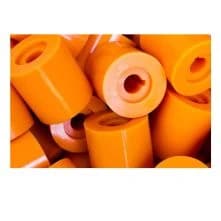BIS Certification for Polyurethanes: IS 17397 (Part 1): 2020 /ISO 16365-1 :2014

Polyurethanes, versatile polymers, are used in a wide range of industries, from automotive to construction and insulation. These materials offer excellent durability, insulation properties, and resistance to abrasion, making them ideal for numerous applications. Polyurethanes are utilized in the manufacturing of foams, elastomers, coatings, adhesives, and sealants, providing enhanced performance, energy efficiency, and product longevity.
Introduction
BIS certification for Polyurethanes is now a mandatory requirement for manufacturers in India. The Ministry of Chemicals and Fertilizers, through the 2023 Quality Control Order, requires that Polyurethane products comply with the Indian Standard IS 17397 (Part 1) : 2020, which is based on the international ISO 16365-1 : 2014. This certification ensures that Polyurethanes used in various sectors meet the required quality, safety, and performance criteria for optimal use. The certification also facilitates smoother market access and guarantees product reliability for consumers.
Why is BIS Certification Necessary for Polyurethanes?
BIS certification ensures that Polyurethane products meet the stringent standards set for quality, safety, and durability. The IS 17397 (Part 1) : 2020 standard provides guidelines for the production, testing, and application of Polyurethanes in various forms. The certification process ensures that these materials are suitable for use in critical applications, such as automotive manufacturing, building insulation, and industrial machinery, where performance and safety are paramount.
The 2023 Quality Control Order mandates that only BIS-certified products are allowed to be sold in the Indian market, enhancing consumer confidence and trust. It also ensures manufacturers comply with both national and international standards, minimizing risks associated with non-compliant products.
Overview of Indian Standard IS 17397 (Part 1) : 2020
The IS 17397 (Part 1) : 2020 standard aligns with ISO 16365-1 : 2014, and it lays down the quality parameters and testing methods for Polyurethanes used in various applications, including automotive parts, construction materials, coatings, and other industrial products. The standard addresses important factors like material composition, mechanical properties, resistance to environmental conditions, and overall product durability.
Compliance with this standard guarantees that the Polyurethane products perform effectively under expected usage conditions and meet safety regulations. The standard emphasizes quality control at every stage of production, from raw materials to finished products, ensuring consistency in quality across all manufacturing processes.
Process for BIS Certification
The process for obtaining BIS certification for Polyurethanes
is a structured procedure aimed at ensuring product compliance with IS 17397
(Part 1) : 2020 / ISO 16365-1 : 2014. Below is a step-by-step overview of the
certification process:
- Application Submission: Manufacturers must submit an
application to BIS, along with relevant documentation.
- Documentation Review: BIS reviews the documents for
completeness and verifies that they meet regulatory requirements.
- Factory Inspection: BIS conducts an on-site inspection of
the manufacturing facility to evaluate the production process, quality control
systems, and machinery.
- Sample Testing: Product samples are taken and tested in
BIS-approved laboratories to confirm they meet the technical specifications and
performance criteria of IS 17397.
- Certification Grant: Upon successful completion of the inspection and testing phases, BIS grants certification, allowing manufacturers to use the ISI mark on their products.
Documents Required for BIS Certification
To apply for BIS certification for Polyurethanes, manufacturers
must provide the following documents:
- Application form
- Manufacturing process details
- Quality control procedures and plans
- Test reports from BIS-accredited laboratories
- Factory layout and details of equipment used
- Proof of business registration
- Product specifications and technical data
- Declaration of conformity to IS 17397 (Part 1) : 2020 and
ISO 16365-1 : 2014
- Environmental and safety compliance certificates (if
applicable)
These documents ensure that the manufacturer adheres to both the production standards and regulatory requirements outlined in the BIS guidelines.
BIS Documents For Domestic and Foreign Manufacturer Check
BIS ISI Mark Certification Costing And Timeline

To Know The Process in Detail, Please Visit:
Under BIS Registration Products ISI and CRS
Conclusion
BIS certification for Polyurethanes in compliance with IS 17397 (Part 1) : 2020 / ISO 16365-1 : 2014 is vital for ensuring high-quality production, safety, and performance across industries. With the increasing demand for reliable and durable Polyurethane products in sectors like automotive, construction, and manufacturing, obtaining BIS certification is critical for manufacturers who want to build trust with consumers and ensure market acceptance. The certification process may seem complex, but with the help of consultancy firms like EVTL India, manufacturers can navigate the process smoothly. EVTL India offers expert services in BIS certification application, document preparation, factory inspections, and testing procedures, ensuring a hassle-free and successful certification journey.Choosing EVTL India not only helps manufacturers meet regulatory requirements but also enhances product credibility in both the Indian and international markets, opening doors for broader business opportunities.
